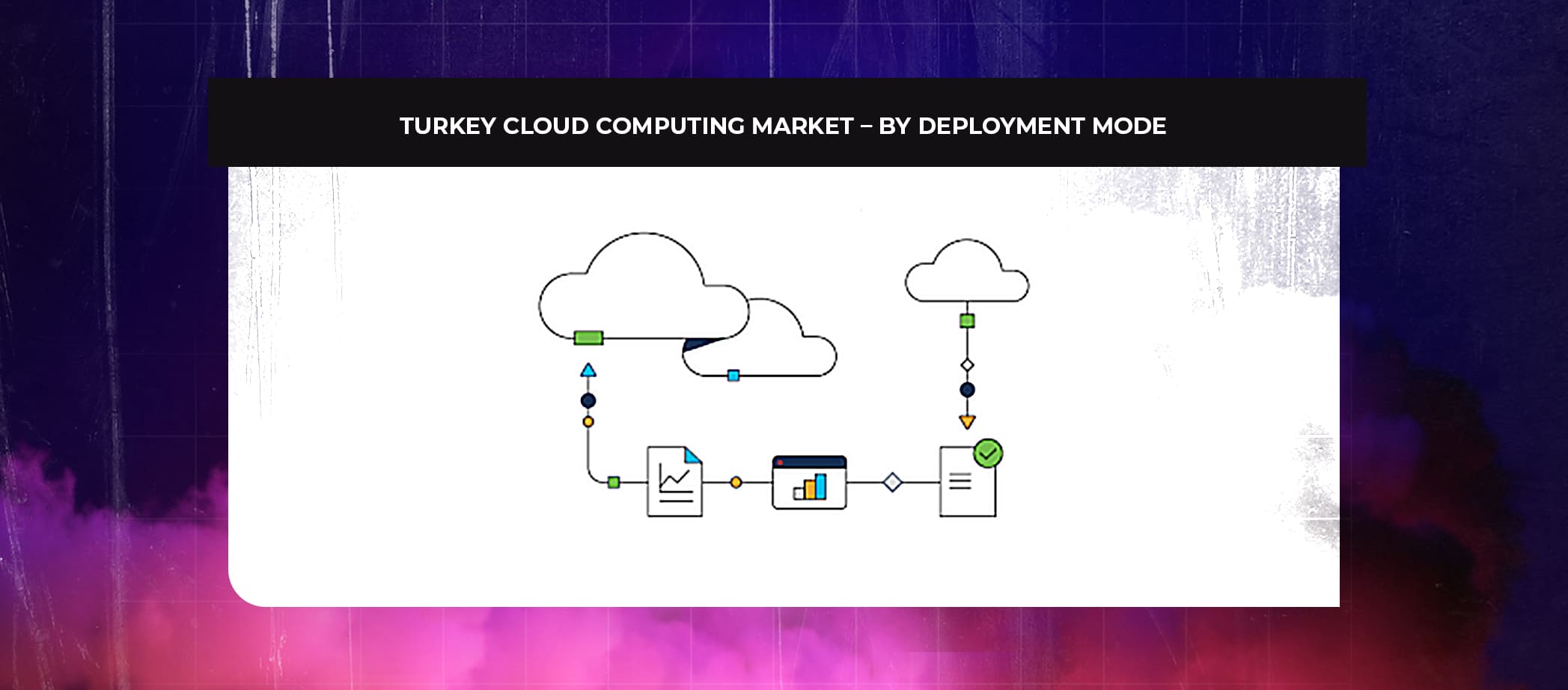Home » Cybersecurity » Cloud Security » Changing Market Trends Due To Adoption of Cloud Computing In Turkey
Changing Market Trends Due To Adoption of Cloud Computing In Turkey

The Turkey Cloud Computing market is anticipated to expand at a CAGR of 21.5% throughout the projected period (2022–2028). The market expansion has been significantly supported by increasing internet usage and the spread of smart devices across the nation. Moreover, to satisfy the 5G standards in the country, the government established the New Generation Mobile Communication Technology forum, which consists of universities, operators, NGOs, and manufacturers. The planned rollout of 5G technology and the expansion of the telecommunications infrastructure are producing a substantial volume of data, which needs to be appropriately stored for processing in the future. The increased number of SaaS start-ups in the nation, such as Vispera and Picus Security, is also having an impact on Turkey’s need for cloud computing.

What is Cloud Computing?
Cloud computing, in its most basic form, is the supply of computer services over the Internet (“the cloud”), including servers, storage, databases, networking, software, analytics, and intelligence. Its benefits include quicker innovation, adaptable resources, and scale economies. Cloud Computing solutions are used by both businesses and consumers. One type of cloud service is audio and video streaming services where the real media files are kept off-site. Another choice would be to use data storage platforms like Google Drive, Dropbox, OneDrive, and Box.
Dedicated Team of Cloud Experts Matching Best With Your Requirements
What are the major factors driving the growth of Turkey Cloud Computing Market?
Reduced infrastructure and storage costs and increased RoI
Businesses are concerned about the on-premises data hosting costs associated with the initial setup and continuing maintenance. Business owners may also be concerned about staffing costs, electricity prices, and downtime issues. The adoption of affordable strategies to restructure company models has increased due to the current level of competition and the state of the global economy. A couple of additional variables that aid in the adoption of cloud computing services and, ultimately, lower business costs are shifting corporate priorities toward digital transformation and the speeding up of customer experience. Additionally, thanks to the cloud’s pay-as-you-go concept, companies only have to pay for the cloud services they utilize. This could aid in cost reduction.
Increasing use of hybrid cloud services
Businesses that already have an infrastructure in place are embracing cloud computing services and are ready to implement a hybrid strategy to gain the advantages of both on-premises and cloud services. Because of their many benefits, including their lack of upfront infrastructure setup costs and availability of computing services on demand, Small and Medium-Sized businesses are primarily adopting cloud computing services. These factors are having an impact on how hybrid cloud services are being used by enterprises. The hybrid cloud has several benefits, including better workload management, increased security and compliance, and efficient integration within DevOps teams. It also gives users the freedom to swap between on-premises and the cloud or between clouds, and it has the required scalability to outperform rivals.
Also Read: Cloud Computing Are Cloud Computing Solutions Worth Putting Into Practice?
Growing smart device use and demand for untrusted cloud
The growing use of smart devices, including smartphones, laptops and desktops to manage escalating data requirements is expected to drive the nationwide distributed cloud market during the projection period. Additional factors contributing to the market expansion include the increasing use of microservice-based software development across a range of industrial sectors and the increased demand for data-driven technologies like artificial intelligence (AI) and the Internet of Things (IoT).

Restraints
Impact of COVID-19 on Turkey’s Cloud Computing Market
To Protect employee well-being and uphold operational effectiveness, many businesses across all industries have embraced the work-from-home model, which has raised the demand for Software-as-a-Service (SaaS)-based collaboration solutions. Additionally, well-known SaaS-based collaboration technologies like Tencent Meeting, Google Hangouts, Cisco Webex, Slack, Zoom, and Ding Talk are becoming more and more popular. There has been a large rise in demand for streaming services like Netflix, Hulu, Amazon, Disney+, Twitch, YouTube, and Apple TV, because of the nationwide lockdowns, which have forced most people to stay at home. There is a greater need for IaaS to meet consumer needs due to the explosion in Video-on-Demand (VoD). Businesses throughout the nation are diversifying their product offerings to cater to the changing needs of their clients.
Cloud’s vulnerability to Cyber Attacks
Cloud computing services help businesses lower expenses and improve operational efficiency. Although the cloud offers many benefits and security precautions, the data stored there is nevertheless open to threats. The amount of data being produced increases and businesses are beginning to move more aggressively toward digital transformation. Enterprise data is vulnerable to cyberattacks like Spectre, Meltdown, cloud malware injection attacks, account or service hijacking, and man-in-the-cloud attacks. Threats like this can restrain Turkey’s cloud computing market’s expansion.
Turkey Cloud Computing Market – By Service
The three service categories that make up Turkey’s Cloud Computing Sectors are Platform as a Service (PaaS), Software as a Service (SaaS), and Infrastructure as a Service (IaaS). Over 54% of total income came from the SaaS category. The popularity of SaaS can be attributed to its low prices, simple implementation and simple maintenance. Industry estimates show that more companies are transferring their operations to the cloud, with 73% of businesses migrating the majority of their applications to the SaaS platform. Remote working has raised a demand for SaaS offerings that enable collaborative teams to access formerly centralized data and analytics. SaaS products are anticipated to expand quickly in the upcoming years as their Total Cost of Ownership (TCO) approaches that of an on-premises deployment mode.
Turkey Cloud Computing Market – By Deployment Mode
Depending on deployment mode, The Turkish cloud computing trends is divided into three categories: Private, Public, and Hybrid. Throughout the forecast period, the hybrid cloud category is anticipated to contribute more to the expansion of the cloud computing market. Businesses are implementing hybrid clouds due to the increased user and resource mobility, increasing application migration to the cloud, and the emergence of more sophisticated threats. The hybrid deployment strategy is used by the government, BFSI, and healthcare industries because these sectors place a high value on customer satisfaction, security, and compliance. Leading cloud service providers are focusing on growing their market share in the hybrid cloud space. All these elements contribute to the market for cloud computing in Turkey expanding at a faster rate than anticipated.

Turkey Cloud Computing Market – By End User
Based on end users, Turkey’s Cloud Computing Industry is divided into five categories: IT and telecom, retail and consumer goods, BFSI, healthcare, and others. Among these, BFSI has a monopoly on the market. Banks have implemented digital transformation due to the rapid increase in online banking activity in the BFSI sector with cloud computing playing a major role in this approach. In the BFSI sector, cloud computing has helped organizations in cutting expenses, promoting innovation, improving client connections, and increasing flexibility. People no longer communicate and conduct business in the same way as before the COVID-19 pandemic. The growth can be ascribed to the adoption of cloud services for managing and storing customer data. Among other services, Payment gateways, online fund transfers, digital wallets, and unified customer experiences, might play a big role in the BFSI sector and promote the general trend of cloud deployment.
Also Read: Era of cloud computing technology rolls out in MENA region
Competitive Landscape
Notable companies in the Turkey Cloud Computing Sector include AGMLab, Skyloop Cloud, Orange Group, Microsoft Corporation, KocSistem, ITGLOBAL.COM, VNGRS, Alibaba Cloud, IBM Corporation, and Sparkle Turkey. The market is extremely fragmented with many enterprises operating throughout the nation. The market leaders maintain their dominance by investing in R&D, adding cutting-edge technology to their products, and producing improved products for consumers. These businesses use a range of tactics, such as alliances, agreements, mergers, and partnerships.
Are you looking to Hire Cloud Engineers to take your business to the next level? Well, PeoplActive not only brings the perfect talent but also offers consultation services on your projects to help you create a roadmap. Let us know your requisitions to hire cloud engineers at competitive prices in the market.
The #cloud is calling. Will you answer?
The post Changing Market Trends Due To Adoption of Cloud Computing In Turkey appeared first on PeoplActive.
*** This is a Security Bloggers Network syndicated blog from PeoplActive authored by Dariel Marlow. Read the original post at: https://peoplactive.com/cloud-computing-market-trends-turkey/





